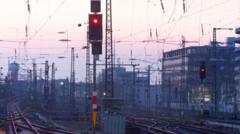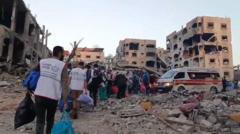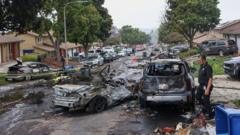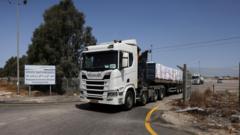Cologne, Germany has initiated a large-scale evacuation, removing approximately 20,500 residents from the city center to safely defuse three WWII bombs discovered at a local shipyard.
Cologne Evacuates Over 20,000 Residents to Safely Disarm WWII Bombs
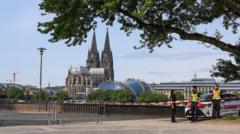
Cologne Evacuates Over 20,000 Residents to Safely Disarm WWII Bombs
Authorities in Cologne take extensive measures as city prepares for bomb disposal operation.
The German city of Cologne is undertaking a significant evacuation effort, as authorities have ordered over 20,500 residents to leave a large area in the city center to facilitate the safe defusal of three unexploded bombs dating back to World War II. These American bombs were uncovered on Monday in the Deutz neighborhood, leading city officials to declare that the operation is the largest of its kind since the end of the war.
In light of the potential dangers posed by unexploded ordnance, police have cordoned off a 1,000-meter (3,280-foot) radius around the site. This evacuation affects not only residents but also businesses, schools, and hospitals, including a major hospital known for its intensive care unit and a prominent train station. Authorities have warned that those who refuse to leave may be forcibly escorted out, with fines imposed for non-compliance.
Evacuation efforts began with city officials going door-to-door to inform residents of the need to vacate. As a result, many streets typically bustling with activity have turned eerily quiet, with cultural institutions impacted and transport services severely disrupted. Most notably, 58 hotels, nine schools, and various government buildings were shut down during this time, and train services were canceled, with the Messe/Deutz station closing at 08:00 local time.
Residents have been advised to stay calm and gather essential items, including identification and necessary medications, while being mindful of their pets. Although Cologne Bonn Airport continues to operate normally, access to the airport via train or car may be hindered. The evacuation has impacted personal plans, with at least fifteen couples forced to relocate their wedding ceremonies to different venues in the city.
Germany's bomb disposal service is scheduled to conduct the defusing operation on Wednesday, contingent on ensuring that all residents have safely evacuated the densely populated area.
This ongoing story highlights the risks posed by remnants of WWII, which are not uncommon in German cities. As the situation evolves, residents and officials remain on alert for updates regarding the safe resolution of this historic threat.
In light of the potential dangers posed by unexploded ordnance, police have cordoned off a 1,000-meter (3,280-foot) radius around the site. This evacuation affects not only residents but also businesses, schools, and hospitals, including a major hospital known for its intensive care unit and a prominent train station. Authorities have warned that those who refuse to leave may be forcibly escorted out, with fines imposed for non-compliance.
Evacuation efforts began with city officials going door-to-door to inform residents of the need to vacate. As a result, many streets typically bustling with activity have turned eerily quiet, with cultural institutions impacted and transport services severely disrupted. Most notably, 58 hotels, nine schools, and various government buildings were shut down during this time, and train services were canceled, with the Messe/Deutz station closing at 08:00 local time.
Residents have been advised to stay calm and gather essential items, including identification and necessary medications, while being mindful of their pets. Although Cologne Bonn Airport continues to operate normally, access to the airport via train or car may be hindered. The evacuation has impacted personal plans, with at least fifteen couples forced to relocate their wedding ceremonies to different venues in the city.
Germany's bomb disposal service is scheduled to conduct the defusing operation on Wednesday, contingent on ensuring that all residents have safely evacuated the densely populated area.
This ongoing story highlights the risks posed by remnants of WWII, which are not uncommon in German cities. As the situation evolves, residents and officials remain on alert for updates regarding the safe resolution of this historic threat.


